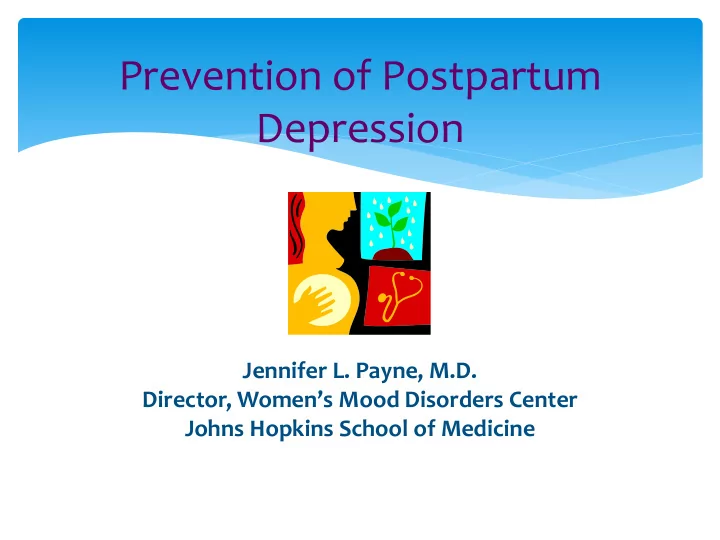

Prevention of Postpartum Depression Jennifer L. Payne, M.D. Director , Women’s Mood Disorders Center Johns Hopkins School of Medicine
Postpartum Depression: Who is at Risk? 10-15% of women in general population 25-50% of women with a pre-existing mood disorder 70-90% of women with a pre-existing mood disorder who stop their meds for pregnancy Genetics play a role Environment plays a role
Myth #1: Women Should Tolerate Being Depressed During Pregnancy for the Sake of the Baby Truth #1: Depression During Pregnancy Leads to Poor Outcomes for Mom and Baby
Why Treat Depression during Pregnancy? Depression during pregnancy is associated with…. Preterm delivery Low birth weight Decreased motor tone and activity in the baby Higher cortisol levels in the baby Poor reflexes in the baby ADHD and behavioral problems, particularly in boys
Depression during pregnancy is one of the biggest risk factors for Postpartum Depression (PPD) Suicide is a major cause of maternal death in pregnancy and accounts for up to 20% of all postpartum deaths PPD is associated with the following in exposed children: Lower IQ Slower language development ADHD Behavioral problems Psychiatric illness
Myth #2: Antidepressants During Pregnancy are Associated with Poor Outcomes for the Infant Truth #2: Well-Controlled Studies Do NOT Find Associations with Adverse Long-Term Infant Outcomes
Antidepressant Use in Pregnancy In Utero Antidepressant Exposure has been associated with: Preterm Birth Low Birth Weight Cardiac Defects Persistent Pulmonary Hypertension Autism BUT……
Problems with the Literature Most studies don’ t control for: The underlying psychiatric illness Severity of psychiatric illness Risk factors that are found in a higher rate in the psychiatric population Diabetes, Smoking, Substance Use, Obesity etc Whether or not the mother was psychiatrically ill during pregnancy Multiple medications
Factors Associated with Antidepressants Confound Studies on Infant Outcomes Antidepressant use during pregnancy is a MARKER for a population of women, different from the general population of women, with attendant risk factors and behaviors that can affect birth outcomes
Apples to Apples Studies which compare women with depression taking meds and women with depression not taking meds during pregnancies do NOT find associations between antidepressants and Heart Defects Studies of women with depression who Persistent Pulmonary didn’t take meds during pregnancy show Hypertension higher rates of pre-term birth and low Autism birth weight
Hype: Google Search- October 2015 Search of “Antidepressants, Pregnancy” 8,950,000 results Added “Harm” 9,160,000 results Deleted “Harm,” added “Safe” 529,000 results A Scary Story is a Popular Story
Comparison of the Wrong Risks The Myth Reality Antidepressant Antidepressant Use Use versus versus No Antidepressant Risks of Untreated Use Major Depression
Stigma
Prevention: The Way Forward Education General Population Physicians Research Screening The US Preventative Task Force recently recommended universal screening during and after pregnancy Psychosocial support programs
Psychotherapy There have been a number of studies of various types of psychotherapy for depression during and after pregnancy Interpersonal Therapy best studied Cognitive Behavioral Therapy also shows promise Mindfulness Based CBT also shows promise Need more well-designed, randomized trials There are numerous barriers to using psychotherapy for many women
A Great Need for Research No studies on the proper management of antidepressants during pregnancy FDA recommends tapering antidepressants prior to delivery- no data Blood levels of antidepressants drop across pregnancy- no data on prophylactic management Only 3 small well-controlled studies on the prevention or treatment of postpartum depression with meds More studies on psychosocial interventions and psychotherapy but these approaches have barriers Until now research is complicated by the fact that not every woman who is pregnant is at high risk
Epigenetics Defined Heritable changes in gene activity which are not caused by changes in DNA sequence DNA methylation and histone modification alter how genes are expressed Why differentiated cells in a multicellular organism only express the genes they need Environmental exposures (like hormone levels during pregnancy) can induce epigenetic changes and change gene expression
Epigenetic Mechanisms
First…the Mouse Screened for genetic loci responsive to high doses of estrogen (to model pregnancy) in the mouse brain Identified loci were cross- referenced with DNA methylation differences identified in blood from women who did and did not develop PPD
The Prospective Study 93 subjects 30 women with Bipolar Disorder 63 women with Major Depression Psychiatric medication use was common and ranged from 49.4%-65.5% during pregnancy 75.4% met DSM-IV criteria for a MDE either during pregnancy, postpartum or both 38 women were clinically well during the 3 rd trimester prior to delivery 15 developed PPD (39.5%), 23 remained well 80% of those with PPD had been on meds during the 3 rd trimester
Epigenetic Biomarkers of Postpartum Depression We identified two biomarker loci at the HP1BP3 and the TTC9B genes that predict PPD in pregnant women with ~80% accuracy Exact functions are unknown HP1BP3 has been shown to associate with the β estrogen receptor TTC9B has been shown to be The Future: Prevention Trials of Women at High Risk responsive to gonadal hormones We have replicated these findings based on Biomarkers in 3 other small samples
Conclusions We need to educate both the general public and physicians that psychiatric medications do not have to be stopped for pregnancy as well as the adverse consequences of untreated psychiatric illness during pregnancy. There has been a lack of research on the proper management of psychiatric illness during and after pregnancy. Interpretation of the literature has been complicated by poorly controlled studies and media hype. Identification and use of biomarkers of PPD will allow more sophisticated and efficient studies on ways to prevent PPD. Stigma continues to complicate psychiatric treatment decisions for women, particularly during and after pregnancy.
Goal: Healthy Mom, Healthy Baby!
Recommend
More recommend